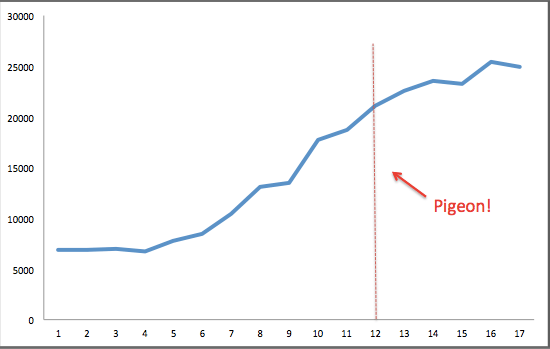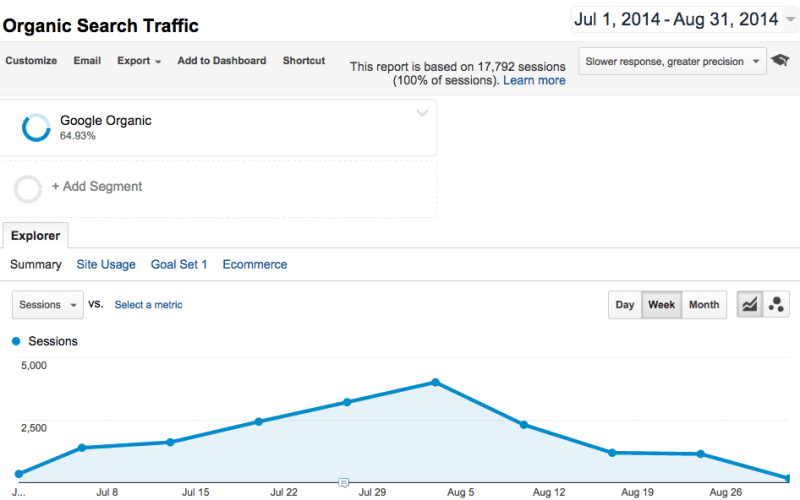Real Client Data On How Google’s Pigeon Update Affected Real Estate SEO
You might be surprised to find that, for one vertical at least, the results after Pigeon were not at all what one would have expected.
This week at SMX East, I’ll be participating in the Deconstructing Pigeon Panel along with David Mihm, Adam Dorfman and Matt McGee, where we’ll discuss the effects of the update which happened at the end of July.
Since we do a lot of SEO work for both local directory sites and local businesses, I am going to be showing some actual client data that demonstrate how both sides of the fence were affected by Pigeon.
Today, I’d like to give you guys a little preview of some of the data I will be sharing for the real estate vertical, which was one of the first that we saw get rocked by Pigeon.
The Pigeoning
I found out about Pigeon when I saw this tweet:
Anybody else seeing map pack missing for real estate searches? @mblumenthal @davidmihm @localseoguide
— Brian Mayo (@brianmayo) July 25, 2014
Since we do a lot of local realtor SEO via our partnership with BoomtownROI.com, I immediately checked the SERPs and saw that, indeed, the local packs were gone for many {city} + “real estate agent” queries.
I don’t panic easily these days, but I definitely did a “¡Dios mio!” before I checked analytics to see how badly traffic had tanked. And the data kind of surprised me.
It hadn’t tanked at all.
In fact, it was going up.
Check this out:
Immediately post-Pigeon (week 8), we saw a distinct pop in Google organic impressions for these local real estate sites.
Now, there is certainly seasonality involved. Historically, early August is a busy time for many of our real estate clients, but it seemed odd to see such a big jump in impressions (>20% in one week) during the same time period where these sites lost a large number of local rankings, particularly for head terms.
These queries were now showing mostly the big national real estate sites (e.g., Zillow, Trulia, etc.) on page one. So, lost head term rankings somehow resulted in more Google impressions?
As you can see in the following weeks as Pigeon started to molt, things settled down to where they had been before the update — yet still, for the most part, the local packs were nowhere to be seen.
I generally don’t trust the Google Webmaster Tools data 100%, so let’s see what Google Analytics had to say:
Again, we could be seeing some seasonality effect — but the organic traffic was on a tear, although the rate of growth had slowed down somewhat vs. what we saw in July (thanks to great home-buying weather, high demand, and some decent SEO).
The absolute numbers were quite strong, with a few thousand more organic sessions across all of the sites. And, not only were they driving great volume, we were also seeing an increase in generated leads, so much so that this happened:
No, the site didn’t break and its rankings didn’t tank. This real estate site was getting overloaded with so many leads that it asked Boomtown to “turn it off” — so we noindexed half the site!
Insights On Pigeon
So, what did we learn about Pigeon from all of this?
1. Local Website Traffic. While the SERPs were definitely shaken up, the reduction of local packs actually resulted in more traffic to local websites when we were expecting it to be less.
2. Local Search Strategies. We are still analyzing the data, but in many cases we saw long-tail rankings go through the roof even as rankings for head terms fell off. In some cases, we saw the percent of traffic to pages other than the home page go from about 55% of organic traffic to about 85%. So, great local content and long-tail strategies are still king.
3. Purpose Of Pigeon? One theory I am pushing these days is that Pigeon may just be Google’s way of saying that going to a local business’ website is not the best way to make a decision when you are in the initial research phase — See Is Pigeon An Acknowledgement That Google & SMBs Suck At Local?
4. Local Business Sites. So perhaps giving the local directories more SERP real estate for head terms while giving the local guys more long-tail — where the more qualified searchers usually are — was part of the goal.
This ties in with the notion that Pigeon was an enhancement of the Venice algorithm, which purported to improve the presence of more locally-relevant sites in the non-pack results.
5. Local Search Success. Certain verticals (maybe eventually, every vertical?) may not need Google Local/Google My Business/Google+ Local to succeed in search.
Or of course, a Google Local engineer could have just spilled their coffee on a server or something…
Final Thoughts
Now, just because all seems A-OK in our little corner of the real estate SEO world does not mean that Pigeon didn’t cause some major league problems.
At the SMX East panel, I’ll be sharing some of those crazy cases as well as more data on the moving and roofing verticals.
I’ll also show how Pigeon has affected some of the big local directory sites (Hint: you will be BLOWN AWAY at what happened! Or perhaps what didn’t happen?)
See you in NYC!
(Editor’s note: Even if you can’t make it to the show, we’ll be posting presentations on Slideshare and recapping many of the presentations in these pages and on Marketing Land.)
Opinions expressed in this article are those of the guest author and not necessarily Search Engine Land. Staff authors are listed here.
Related stories
New on Search Engine Land



